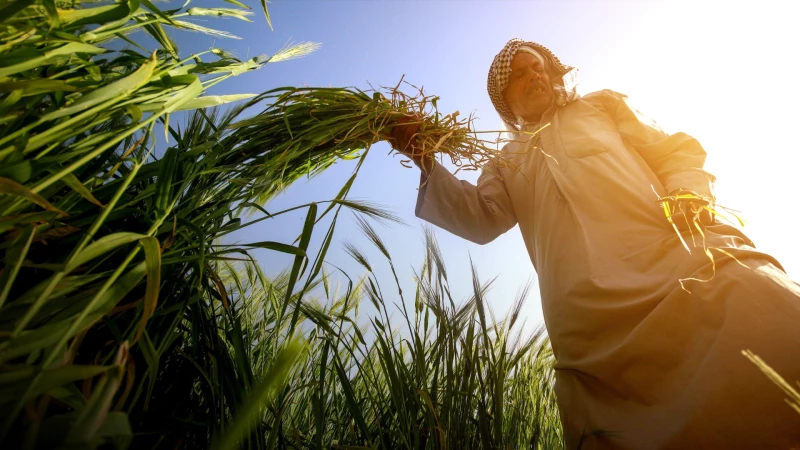After just a few months since its inauguration in 2017, David Kurd, the manager of ABC restaurant located in Erbil, the capital of the Kurdistan Region, found himself grappling with a perplexing issue. The restaurant, operating with a buffet-style service, boasted an impressive array of 660 different food options for its patrons. However, as customers departed, a significant amount of food remained unbeaten, leaving Kurd puzzled about how to manage the surplus effectively.
"Why do patrons leave considerable portions of food untouched on their plates?" This question lingered in David's mind as he observed the dining habits at his restaurant.
It was not long before he realized that this phenomenon was intricately linked to the cultural norms prevalent in Iraqi society, with all its nuances and complexities.
"I came to realize that the buffet setup aligns closely with Iraqi cultural norms. In Iraqi households, individuals are accustomed to being presented with a full meal, typically sitting down to consume it in its entirety before moving on,” he said. “The notion of returning repeatedly to prepare additional dishes themselves is unfamiliar to them.”
David asserted that 65 percent of his restaurant's patrons load up their plates with as many dishes as they can manage.
"Once they have finished their appetizers and beverages, the main course often cools off, prompting the diner to swap it out for a fresh, hot serving, triggering waste in the process."
To tackle the mounting waste issue, David struck a deal with a waste management firm in Erbil and introduced a fresh, systematic approach at the eatery he manages to categorize the excess food into two distinct types.
The first type is whisked away by the waste management company, where it is transformed into organic compost. As for the second type, the waste management company sorts it and delivers it to stray dog shelters across Erbil.
Kurdi confirmed that initially, the waste ratio in food leftovers reached 70 percent. However, after managing the surplus and handing it over to the waste management company, it decreased to 20 percent.
Now, out of every 100 kilograms of rice or 100 kilograms of meat, approximately 5 kilograms are wasted. This decrease represents a significant improvement in the restaurant's waste management practices, making it a more sustainable operation.
The Iraqi culture's approach to food, combined with a tradition of abundance during events driven by a sense of “generosity", results in significant quantities of leftover food accumulating in both restaurants and homes. While some restaurants opt to sort and repurpose what customers leave behind, the majority dispose of the surplus by discarding it into containers.
This sentiment is echoed by Shivan Ali, who oversees a restaurant in Duhok. He noted that the volume of uneaten food left on tables tends to rise alongside meal prices and the variety of dishes served.
"Apart from bread, which we gather along with meat scraps, all other leftovers are consigned to the containers,” he said.
Five million tons wasted annually
According to a mid-2022 report by the United Nations Environment Programme, Iraq trailed only Bahrain in the Central Asia region regarding food waste.
The report revealed that an average Iraqi discards around 120 kilograms of food per year, contributing to an annual food waste tally of approximately five million tons in the country. This is despite figures from the Iraqi Ministry of Planning showing that roughly 25 percent of the population grapples with poverty.
In response to these findings, the Ministry of Planning convened a workshop on August 23, 2023, advocating for legislation to address and mitigate food waste. The proposed measures aim to regulate and combat waste, while promoting redistribution, recycling, and donation of surplus food resources.
Aseel Adel, who heads the Sustainable Development Department at the Ministry of Planning's Department of Regional and Local Development, highlighted a significant gap in Iraq's legal framework.
She emphasized that there is currently no legislation addressing waste management. Consequently, the ministry's efforts primarily focus on encouraging municipalities and cities to implement waste sorting initiatives.
Adel stressed that through effective sorting practices, it becomes feasible to assess the extent of food waste and establish a comprehensive database for further action and analysis.
She emphasized the importance of allocating funds to enhance capacities in combating hunger and reducing waste.
Adel advocated for collaboration with international partners to leverage expertise in this domain, viewing it as a pivotal step towards addressing the issue, underscoring the Ministry of Planning's commitment to advocating for legislation and initiating measures to tackle waste.
She further highlighted the ministry's active participation in workshops and conferences aimed at addressing these pressing concerns.
Adel outlined key proposed measures to address the issue, notably emphasizing the need for intensive awareness campaigns. These campaigns aim to challenge Iraq's cultural norms surrounding food consumption through workshops, training sessions, and media initiatives. Their focus is on highlighting the detrimental effects of waste and food loss on food and water security.
Waste and food security in Iraq
Official government data reveals that food security in Iraq encounters numerous challenges, particularly within the agricultural sector. The data indicates that the agricultural output's contribution to the gross domestic product is relatively low, signaling a deficiency in the local agricultural sector's ability to meet food security demands.
Moreover, climate change compounds the issue by diminishing available water for agriculture and irrigation over the past three seasons, resulting in drought conditions.
This presents a significant barrier to agricultural advancement. As emphasized by Adel, "achieving self-sufficiency in crops does not automatically ensure that all provinces or households have enough food to fulfill their requirements. Access to food is a crucial aspect of food security."
Abdulrahman al-Mashhadani, an economics specialist, highlighted that Iraq was anticipated to attain self-sufficiency in wheat production by the conclusion of 2023, with output projected to reach five million tons. Wheat stands as a staple food in nearly every Iraqi household.
"The government purchases the crop from Iraqi farmers at 850,000 dinars, which is $200 above the global market price, to provide them with support,” He elaborated. “Nevertheless, a notable proportion of those receiving flour rations do not utilize it due to a shift towards consuming ready-made bread. Consequently, they sell their allocations, often repurposed as fodder."
"However, considering the drought seasons and the reduction in cultivated areas as per agricultural plans, it's improbable that local production will reach 5 million tons,” he added. “This may result in a persistent deficit in this vital food item for the Iraqi populace. Wheat-producing nations, akin to those producing rice, typically curtail exports during crises, leading to price hikes that will inevitably impact Iraqi food security."
With Iraq’s financing allocations heavily dependent on over 95 percent of state oil sales, Iraqi food security is perennially at risk due to the potential downturn in oil prices.
Economic experts caution that any dip in the price per barrel below $70 would result in a financial shortfall significantly affecting the government's initiatives to bolster individuals' food security.
The Ministry of Planning lacks data on poverty rates in 2023. However, ministry spokesperson Abdul Zahra al-Hindawi indicated in January 2023 that "the poverty rate had reached 25 percent of the total population in 2022," underscoring that "this figure represented an increase compared to 2019 and 2020 when it did not surpass 20 percent."
Hindawi attributed the rise in the poverty rate to the aftermath of the COVID-19 pandemic throughout 2020 and 2021, compounded by the economic downturn stemming from dwindling oil prices and the halt of government initiatives, amidst political strife and the postponement of the annual budget approval.
However, Adel contended that "Iraqis do not endure hunger or malnutrition," suggesting that the issue of poverty extends beyond mere food accessibility or equitable distribution to all individuals.
Rates of waste
Mashhadani casts doubt on the viability of the Ministry of Planning's initiative to tackle food waste, despite its significance, citing Iraqis' lack of readiness for substantial action in this realm due to cultural norms entrenched over generations.
He highlighted that besides restaurants, instances of food wastage in the country stem from a tradition of preparing diverse dishes at home, particularly during occasions such as Ramadan, weddings, funerals, and religious gatherings. Municipal authorities in various cities, he noted, grapple with the challenge of disposing of surplus food as waste.
He highlighted what he identified as the "waste phenomenon" with an example.
"In most homes across Baghdad and other cities, you will find bread bags hanging on walls because Iraqis tend to take more bread than they need, anticipating that guests might join them at any moment,” he said. “This practice impacts the consumption of other meal components. As a result, approximately one-third of food in Iraq is wasted and ends up as refuse.”
Mashhadani further pointed out out the situation during religious pilgrimages to Shia holy sites in southern Iraq, noting that "assuming there are 22 million visitors, and just one million of them consume a single small plastic water bottle each, that translates to one million plastic bottles being discarded. If we extend this to food and plastic utensils, the scale of waste becomes staggering, complicating disposal and contributing to environmental pollution."
Data from the Karbala Municipality underscores this concern. Throughout the period of Imam Hussein's Arbaeen pilgrimage in 2022, officials reported the collection of 149,000 tons of waste. Following the conclusion of the Arbaeen pilgrimage in September 2023, the Karbala Municipality had amassed nearly 200,000 tons of waste, deploying over 500 cleaning vehicles.
According to data from the Central Statistical Organization for the Environmental Services Sector in 2021, the total annual collection of regular waste, which includes food waste, stood at 11.2 million tons.
On average, each person generates 1.3 kilograms of waste per day, with a significant portion of this waste ending up in landfill sites lacking environmental approvals, totaling 149 landfills.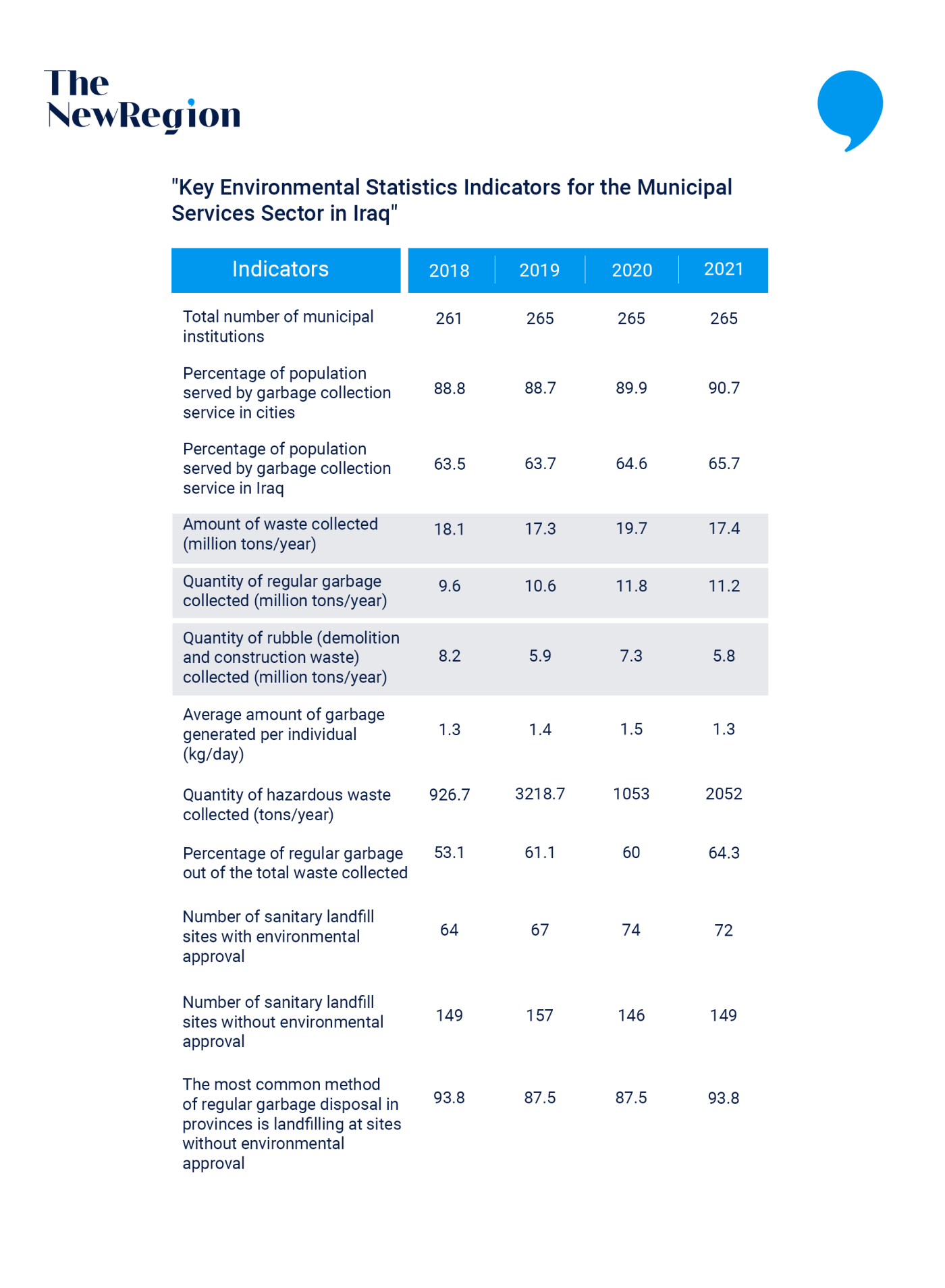
Harmful emissions
According to a report by Rosa Rolle, Senior Advisor for Project Development at the Food and Agriculture Organization of the United Nations (FAO), published on the United Nations website in September 2022, approximately 14 percent of global food, valued at $400 billion annually, is lost post-harvest and before reaching retail outlets, while 17 percent is wasted in households, industries, and food services.
The issue of food loss and waste puts significant strain on the environment and the natural resources involved in its production, resulting in environmental pollution and emissions that have adverse effects on the climate.
About one-third of greenhouse gas emissions are attributed to human activities related to food production and waste. The report highlights that globally, food waste is a major contributor to greenhouse gas emissions.
The United Nations website offers insights into the emissions associated with various types of food, particularly those commonly consumed in Iraq, such as meat, poultry, fish, and rice.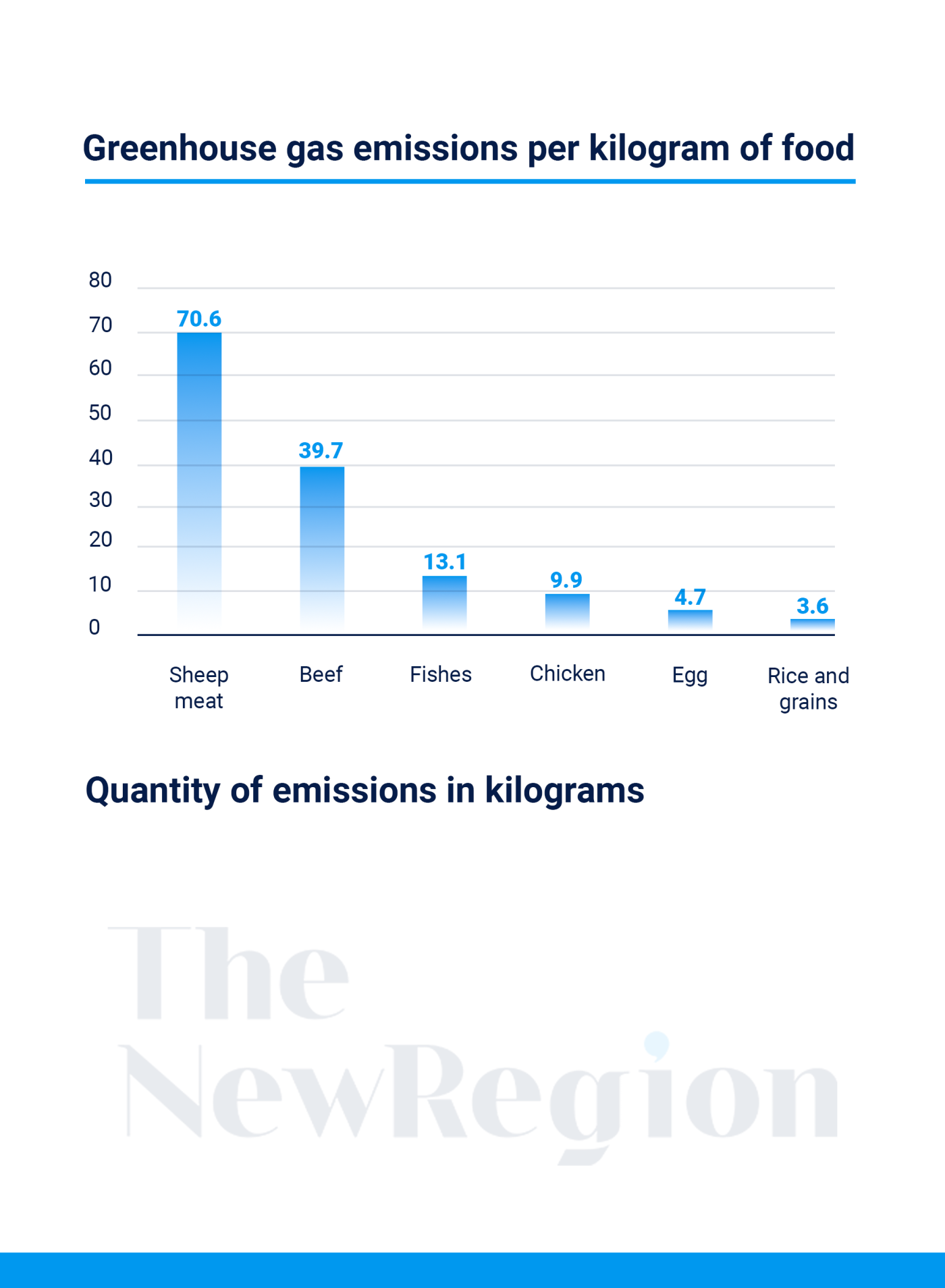
As per Sadiq al-Mousawi, Baghdad's Environment Director, the Iraqi environment bears the brunt of food production and waste, disregarding the economic implications involved.
He emphasized that food wastage in Iraq translates to squandering "water, energy, and a variety of chemical and food production resources primarily."
Additionally, the emission of greenhouse gases exacerbates the issue, as food waste decomposes under oxidation, resulting in substantial methane gas emissions, which significantly contribute to global warming.
Mousawi cautioned that "disposing of food waste in sewers or indiscriminate landfills leads to the leakage of chemical substances, contaminating groundwater and surface water."
The situation is further exacerbated by the absence of a comprehensive waste sorting system across the country, including in the capital Baghdad, which houses nearly nine million people. Waste is predominantly mixed, burned, or disposed of in ways that do not adhere to proper scientific protocols.
Nonetheless, Mousawi remains optimistic about several local initiatives spearheaded by organizations and volunteer teams, alongside small-scale projects backed by the Municipality of Baghdad.
These endeavors, according to him, are geared towards "eradicating waste from streets and public spaces, fostering a recycling culture, and guaranteeing appropriate waste disposal through collection and sorting."
Mousawi stressed the importance of launching an efficient recycling initiative for waste, beginning with its collection from households, institutions, and restaurants.
The next step involves transporting it to recycling facilities for sorting by type (plastic, glass, organic waste). This process allows recyclable materials to be repurposed for creating new products, thereby curbing the depletion of natural resources.
A report by the Japan International Cooperation Agency, released in 2022, unveiled alarming figures regarding food waste remnants in three key Iraqi cities of Baghdad, Erbil, and Basra. The findings indicate that waste rates surpass one-third in each of these cities.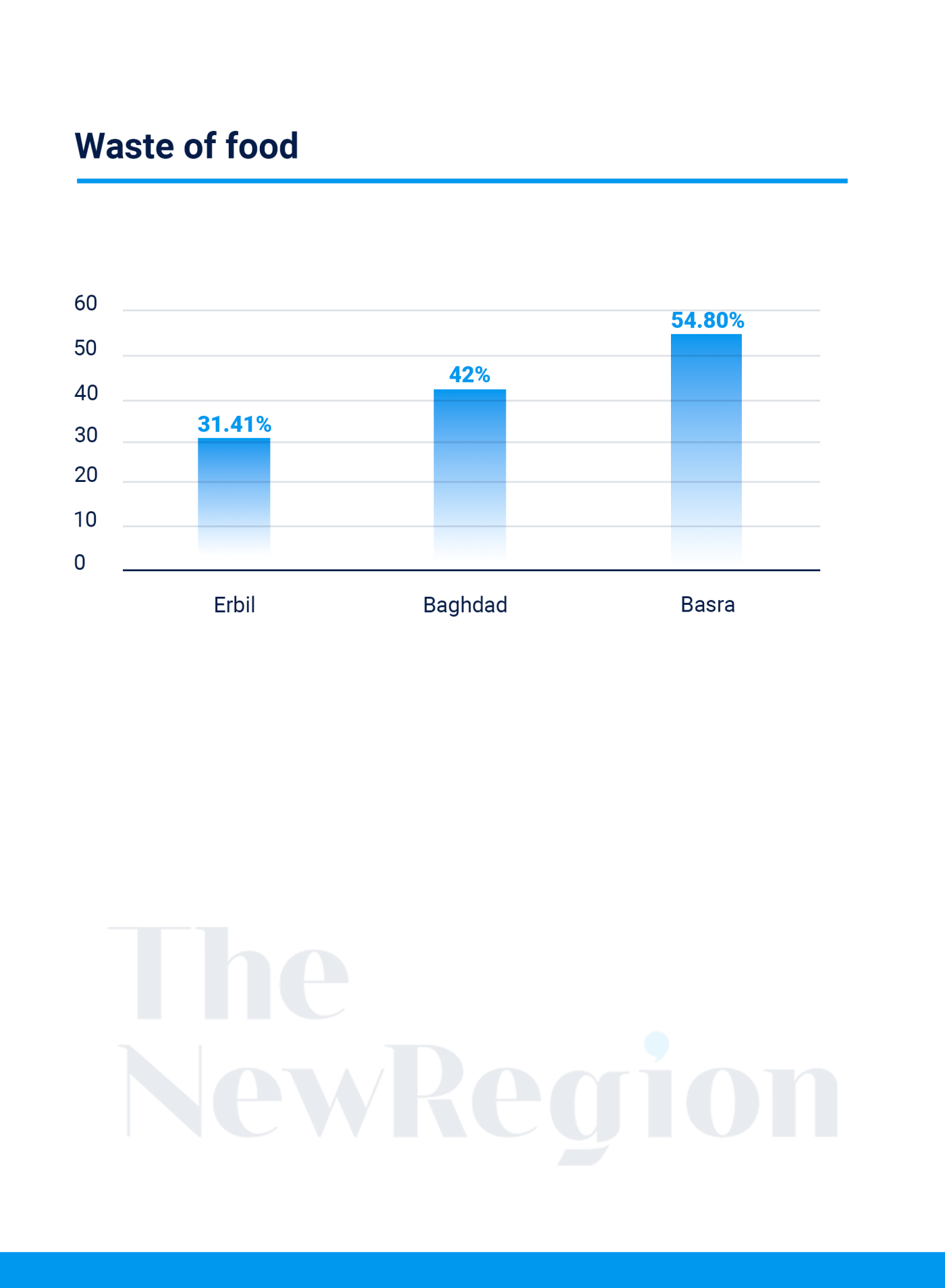
Recycling offers the solution
In January 2024, the Baghdad Environment Directorate unveiled a strategy aimed at closing and clearing "unsanitary landfill sites failing to meet regulatory standards, as well as waste quarries."
This initiative represents a fresh approach by the ministry, intended to be rolled out nationwide.
According to the Directorate, the ministry's objective is to enact sustainable development initiatives by capitalizing on waste. This includes sorting waste, recycling materials suitable for recycling, generating electricity by incinerating non-recyclable waste, and tapping into gases produced at landfill sites for energy production or as fuel. Additionally, there are plans to explore the use of waste in the production of organic fertilizers.
Murad Khalid, a retired engineer who splits his time between Sweden and visits to Iraq, proposes a comprehensive national waste recycling initiative as the solution. He points to the model employed in Scandinavian countries like Sweden, Denmark, and Norway, where every residential unit is equipped with four separate containers: one for food waste, another for paper and cardboard, a third for metal and glass cans, and a fourth for plastic.
When it comes to clothing, footwear, leather bags, and belts, residents deposit them into large designated containers situated in each residential neighborhood. These items are subsequently sorted, with usable ones being sent to developing countries, to be sold in the thrift market, while those unfit for use are either disposed of or recycled.
Khalid highlighted that buses in Sweden run on fuel derived from recycling food waste, while fertilizer and various industrial materials are produced from it. This approach addresses concerns regarding sanitary landfilling, ensures ongoing city cleaning, and prevents waste buildup, with food waste being a major focus.
Umm Ahmed, a homemaker in a family of five residing in Kirkuk, remarked that her kitchen frequently sees an abundance of food, particularly bread and rice, both of which are staples in her household. Rice is a daily dish, essential in both home meals and restaurant menus, as well as in lavish banquets prepared for guests.
"Hospitality demands that we present generous and varied meals. It would be embarrassing to offer our guests a simple or meager dish,” she said.
But Umm Ahmed, meanwhile, does not simply throw away all the excess food from banquets. She employs two approaches: firstly, she stores the meat and serves it to her family the following day. As for the surplus rice on plates or in the “mansaf", she discards it by disposing of it with the garbage. Any leftover "clean" food still in the cooking pots is either shared with neighbors or given to relatives, particularly if the feast was prepared for them.
Bahar, residing Erbil’s Ainkawa town and managing a household of four, shares that her refrigerator consistently brims with various food items.
Her family's preference for distinct dinner meals, typically featuring some form of meat, be it red or white, adds to the variety. Additionally, she is tasked with preparing multiple dishes, resulting in a table overflowing with food, along with leftovers thereafter.
She noted that her children consistently turn down leftover food from the prior day, prompting her to discard it. She's adopted a solution akin to David, the ABC restaurant manager, by utilizing a small shelter for dogs initiated by local residents. They now repurpose their excess meals by providing them to the dogs.
"In doing so, we demonstrate compassion for these animals... and it is preferable to witnessing food leftovers in trash cans," she said with a smile, before reflecting, "without these animals, we would be compelled, like others, to discard it... I understand this is not a remedy, and it does not halt the waste we have grown accustomed to, but it offers us some solace."
* This feature was produced in collaboration with the Network of Iraqi Reporters for Investigative Journalism (NIRIJ)


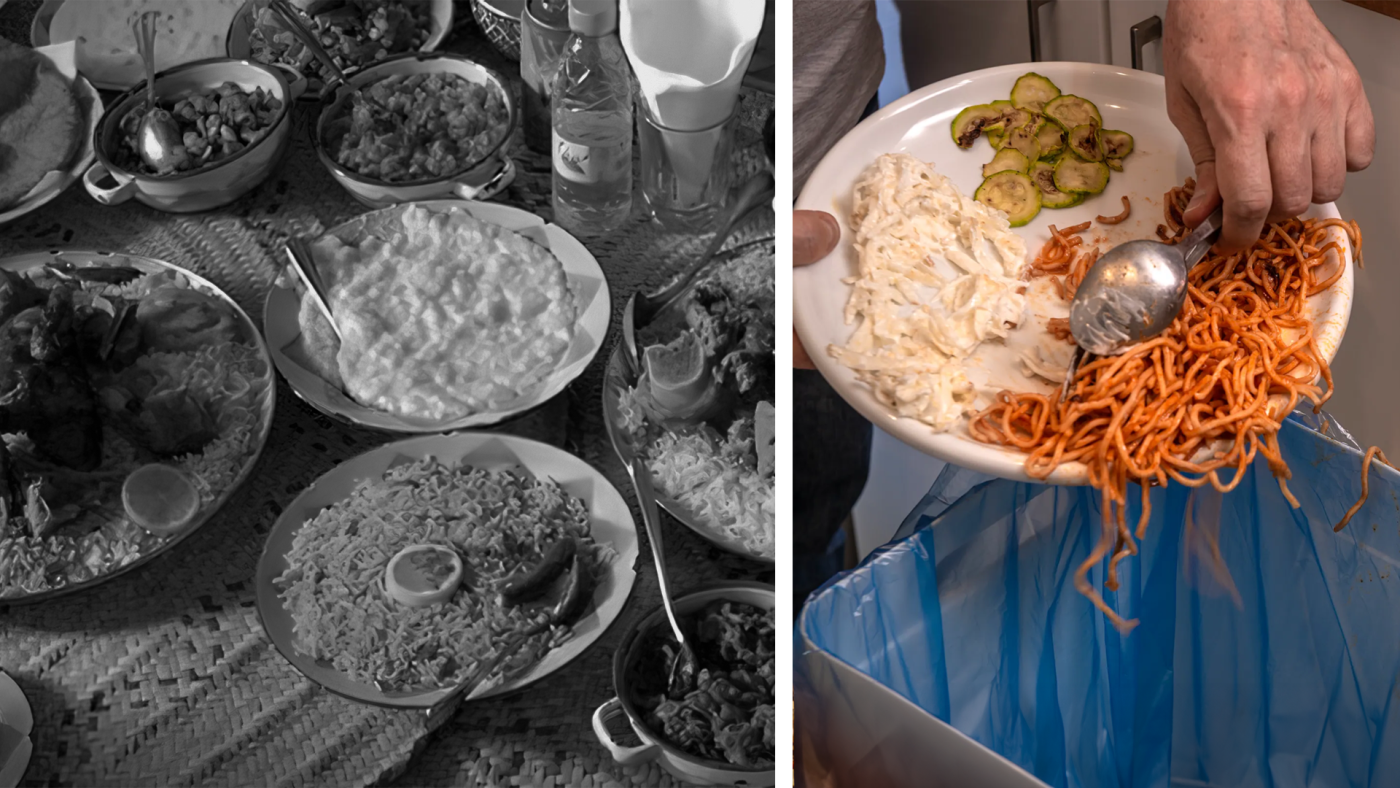
 Facebook
Facebook
 LinkedIn
LinkedIn
 Telegram
Telegram
 X
X
